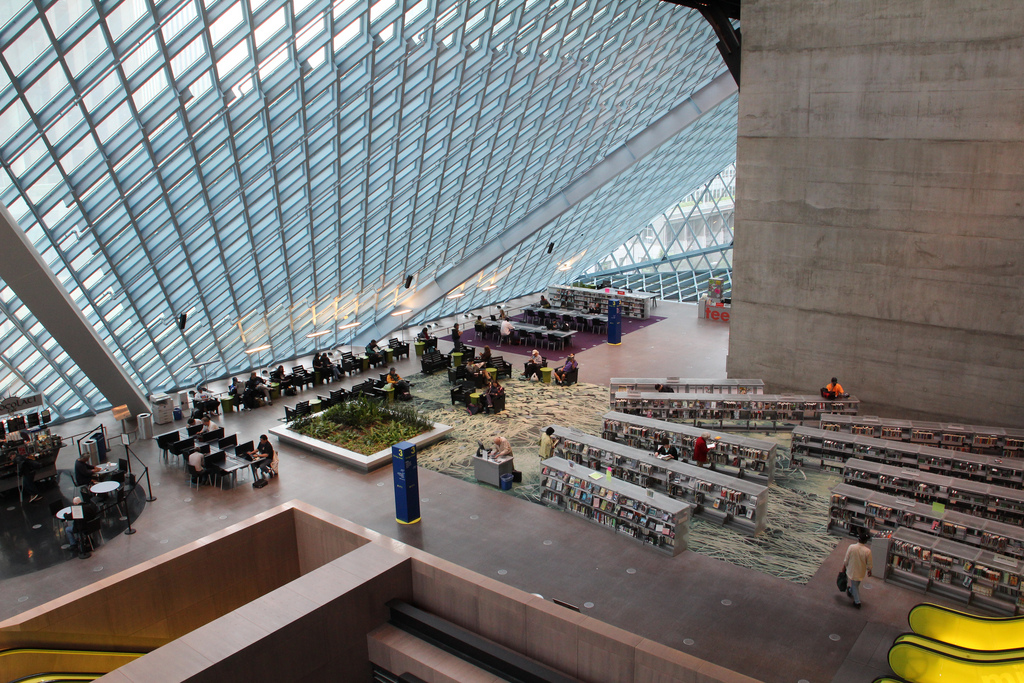
Libraries go from building collections to making connections
Photo credit: Flickr user Jeff Maurone
Patrons want to see four things from their local libraries, Lee Rainie told library directors from across the country in Miami this weekend: access to technology, quiet spaces for reading, reference expertise and the ability to borrow books – both in print and digitally. Related Link

Rainie, the director of the Internet & American Life project at the Pew Research Center, cited new research indicating public libraries continue to be vital community resources: 91 percent of Americans said they are important to their communities and 76 percent said they are important to them and their families. As libraries remain both centers of research and community engagement, many are now also serving as innovation hubs. They’re helping engage people around things like public information, civic life and more, Rainie said at the gathering sponsored by Knight Foundation. Here are a few examples:
- An augmented reality app now allows users to explore German cultural heritage in New York. Users simply hold up their smartphones to view archival photos layered on top of the images that are visible through their phone’s camera (developed by The Goethe-Institut New York Library and Pratt Institute).
- Inspired by a discussion about creative advocacy, The Library as Incubator Project highlights the ways that libraries and artists can work together by showcasing partnerships in communities across the country. Ideas range from dance lessons in libraries to an in-depth series on the art of antique letterpress printing.
- In Orlando, Fla., a one-stop mobile website addresses a growing need in public libraries to help patrons seeking government assistance. Right Service at Right Time – developed by the Orange County Library System – uses a database-driven engine to connect people in need of government and non-profit public services.
- Contra Costa, Calif.’s Snap & Go brings library services to its residents mobile phones, using QR technology. For example, users can wirelessly download audio books, ask librarians questions and more.
And yet despite innovation, being a library in the digital age isn’t without its challenges, Rainie said. Many struggle with how to manage print book collections, for example, and debate whether some library stacks be moved off-site to make space for tech centers, reading rooms or cultural events. Better educating patrons about their services is another challenge. Research showed that just 22 percent said they know all or most of the services offered by their local libraries. There is also a need to figure out how to best serve constituencies who want traditional services in addition to new ones like digital literacy training, access to the Internet and more e-books. When surveyed about additional services libraries should offer, the majority of people were strongly in favor of having them coordinate more closely with local schools, offer free literacy programs for children, accommodate more comfortable spaces for reading and provide a broader selection of e-books. Rainie’s talk kicked off a two-day conference hosted by Knight Foundation to explore how libraries are shifting from building collections to making connections. Through its Libraries Initiative, Knight is helping libraries in 26 communities become digital community centers to foster informed and engaged communities. We’ll be sharing more insights from the conference, including an update on the Digital Public Library of America’s Knight-funded project to make our country’s local archives digital, searchable and freely accessible. Stay tuned to @knightfdn and #infoneeds for future content. The gathering of library directors will be followed by Knight’s Media Learning Seminar. Kicking off Monday, it will bring together leaders in philanthropy, media and tech to explore how foundations can, and already are, helping residents be informed about the issues that shape their communities. Join the conversation via the livestream. By Elizabeth R. Miller, communications associate at Knight Foundation
Recent Content
-
Communitiesarticle ·
-
Communitiesarticle ·
-
Communitiesarticle ·


